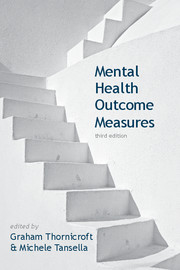Book contents
- Frontmatter
- Contents
- List of tables, boxes and figures
- List of contributors
- Foreword
- Foreword
- Preface: an evolving perspective of mental health outcome measures
- Part I Methodological issues
- 1 Measures of outcomes that are valued by service users
- 2 Statistical methods for measuring outcomes
- 3 Assessment instruments in mental health: description and metric properties
- 4 Using outcomes in routine clinical practice to support recovery
- Part II Domains of outcome measurement
- Part III Symptom severity outcome measures
- Part IV International approaches to outcome assessment
- Index
2 - Statistical methods for measuring outcomes
from Part I - Methodological issues
Published online by Cambridge University Press: 02 January 2018
- Frontmatter
- Contents
- List of tables, boxes and figures
- List of contributors
- Foreword
- Foreword
- Preface: an evolving perspective of mental health outcome measures
- Part I Methodological issues
- 1 Measures of outcomes that are valued by service users
- 2 Statistical methods for measuring outcomes
- 3 Assessment instruments in mental health: description and metric properties
- 4 Using outcomes in routine clinical practice to support recovery
- Part II Domains of outcome measurement
- Part III Symptom severity outcome measures
- Part IV International approaches to outcome assessment
- Index
Summary
This book concerns promotion of the routine use of outcome measures in clinical practice; the purpose of this chapter, however, is to warn care providers to think very carefully before routinely (naively?) using such measures. Just what are the benefits of their use? What are the outcome measures intended to demonstrate? In order to try to convince the reader that there might be real difficulties in the interpretation of the results, the main body of the chapter concentrates on the difficulties in the interpretation of data from structured research projects specifically designed to evaluate an innovation in mental healthcare provision. The difficulties of interpreting haphazardly collected data as part of routine clinical or administrative practice will be far greater. One of the main purposes of an evaluative exercise is comparison: which approach to service provision is the better? If care providers really want to be involved in mental health service evaluation then their time would be much better spent in taking part in a large multicentre trial.
Outcome measures in routine clinical practice
The title of this chapter might have been better formulated as ‘Statistical problems in the interpretation of outcomes’. The main aim of the chapter is to point out the great difficulties in the analysis and interpretation of routinely collected but unstructured clinical outcome data. But it will make this point by discussing the design and analysis of research programmes, on the assumption that if the reader is convinced of the difficulties of doing worthwhile research then he or she might realise how difficult it can be to make sense of data collected as part of routine clinical practice. The collection of outcome data has a cost, however well hidden that cost might be. In the context of a research study, there are staff specifically employed to collect the data. It is a very time-consuming and expensive activity. Given the cost of collecting, recording and analysing data, one must ask whether the benefits of the exercise are worthwhile. Just what are the intended benefits? What are the data meant to show, and to whom? Clearly, with the development of ever larger and more sophisticated databases (the explosion of so-called eScience) there will be ever more data available for people to analyse and from which to draw questionable conclusions.
- Type
- Chapter
- Information
- Mental Health Outcome Measures , pp. 15 - 27Publisher: Royal College of PsychiatristsPrint publication year: 2010

